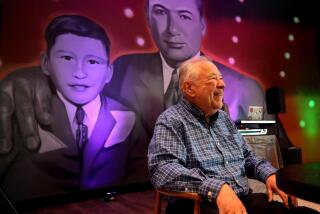Honesty of ‘Family’ Stirs Souls
As the first movie to tell an epic American story with all Latinos in major roles, the release of New Line Cinema’s “My Family” marks a cinematic and social milestone for Latinos in Hollywood. Such praise for the movie’s casting is not a matter of quotas or “correctness” but is, as The Times’ Kenneth Turan recognized in his review of the film, a matter of artistic integrity. It’s also a matter of honesty. At long last Latino self-expression promises to reunite Latinos with the estranged media images of ourselves and to explode stereotypes with the complexity of our experiences.
Unfortunately, the comments of Mira Nair, director of “The Perez Family,” remind us that exploring Latino themes without the creative involvement of Latinos still results in overt expressions of racial insensitivity (“Miami Masala,” Sunday Calendar, May 7).
In explaining her decision not to cast Latino actors, Nair describes a movie casting system guided from the first cut by a hierarchy of racial aesthetics in which, she explains, “you have to cast someone who is pleasing both to the eye and to the soul.” According to Nair, it was a combination of pleasures “none of the Cuban actors could offer. . . .” Her comments reminded us of a quote from actor John Leguizamo, who says Hollywood’s attitude toward Latinos is: “You people are interesting enough to make films about but you aren’t good enough to play yourselves.”
*
This separation of the Latino image from Latinos themselves is not new. The practice has long been defended as the artistic license of those directors handicapped by the limits that prejudice places on the imagination. Unfortunately for Latinos, the result has been as functional as it is offensive.
For years, a consistently deviant media image of Latinos has reflected and reinforced the myth of Latinos as foreigners to the United States. In film, the message was delivered through ethnic caricatures: Images of a people who did not really exist were used by filmmakers to identify people they felt did not really belong. It was such a prejudiced notion of American identity that incited the forceful and indiscriminate deportation of hundreds of thousands of Mexicans and Mexican Americans in the 1930s.
More than a half-century later, “My Family” brings the tragedy of that injustice to the silver screen. In doing so, the film redirects the influence of the medium to repair our cultural dislocation and reposition Latinos in cinematic and popular history. Artistically, this progressive vision is executed with an integrity and honesty that must surely embarrass those, like Nair, who hide behind the excuse that Latino actors lack a certain “appeal.”
*
Though Nair’s comments prove that there remain ample reasons for Latinos to fear the movie industry as a historic source of ethnic caricatures and exclusive casting, we will no longer deny ourselves of its value as the most popular forum in which to enact one of the lessons that Cesar Chavez taught us: We must tell our stories to the entire nation if we are to stir its conscience.
“My Family” promises to stir this country’s conscience with the memories of generations of Latinos. In those memories of joy and pain, we can all be reminded of why we dream and aspire to work together until the day our dreams come true.
More to Read
Only good movies
Get the Indie Focus newsletter, Mark Olsen's weekly guide to the world of cinema.
You may occasionally receive promotional content from the Los Angeles Times.










